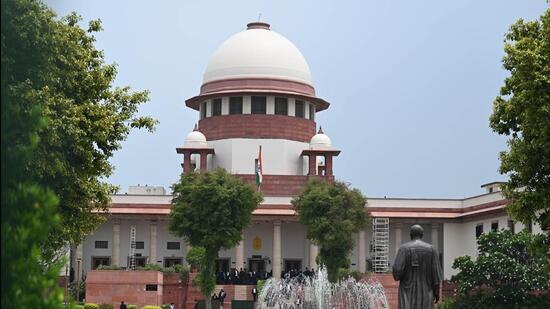Only Parliament can make alterations to Presidential List: SC judge
Justice Trivedi noted that states have neither executive nor legislative power to sub-classify the castes, races or tribes specified as the “Scheduled Castes” in the Presidential List notified under Article 341 of the Constitution.
Justice Bela M Trivedi on Thursday dissented from the majority ruling of the seven-judge bench concerning the sub-classification of Scheduled Castes (SCs) and Scheduled Tribes (STs), holding that states lack the authority to sub-classify, subdivide, or re-group the castes, races, or tribes that are designated in accordance with the President’s exercise of constitutional powers.

Diverging from the stance of the other six judges on the bench, justice Trivedi noted that states have neither executive nor legislative power to sub-classify the castes, races or tribes specified as the “Scheduled Castes” in the Presidential List notified under Article 341 of the Constitution.
The judge underscored the finality and sanctity of the Presidential List, adding that once a caste, race or tribe is included in this list, it becomes a “Scheduled Caste” for all constitutional purposes, and this status cannot be altered by any authority, except Parliament through legislation.
Highlighting that not even the president has the power to vary the list once notified, she said this interpretation is crucial for maintaining the homogeneity and special status of SCs across the country.
The judge further clarified that Article 341 creates a “deeming fiction” whereby all castes, races, and tribes included in the Presidential List are collectively regarded as SCs, regardless of the criteria used to recognise them in a particular state.
“Thus, the etymological and evolutionary history and background of the nomenclature ‘Scheduled Castes,’ coupled with the Presidential Orders published under Article 341 of the Constitution, make the ‘Scheduled Castes’, a homogenous class. The necessary corollary would be that all the members of all the castes, races and tribes enumerated in the Presidential List are deemed to be ‘Scheduled Castes’ for the purposes of the Constitution and they all would be entitled to all the benefits granted or reserved for the Scheduled Castes’...,” she held.
Justice Trivedi took a firm stance against the power of states to make any variations to the Presidential List, stating that there is no provision in the Constitution that allows states to alter the list for the purposes of reservations under Articles 15 and 16. She referenced the actions of Andhra Pradesh and Punjab, where attempts were made to pass legislations that would sub-classify SC/STs for reservation benefits. These attempts, the judge said, amounted to “tinkering” with the Presidential List, which is expressly prohibited by Article 341(2).
Her dissent argued that such state actions, even if well-intentioned as affirmative action for the “weaker of the weakest” castes, are unconstitutional and represent a “colorable exercise of power” – an attempt to achieve indirectly what cannot be done directly. She warned that any such sub-classification by states could lead to reverse discrimination, violating the principle of equality enshrined in Article 14 of the Constitution.
Justice Trivedi’s dissent also addressed the importance of judicial discipline, particularly the doctrine of stare decisis, which obliges smaller benches to follow the decisions of larger benches unless there is a compelling reason to deviate. She expressed concern that the majority opinion undermined the settled law established by the Constitution Bench in EV Chinnaiah (2004), which had held that the states do not have the power to sub-classify SC/STs.
She criticised the three-judge bench in Davinder Singh case for referring the matter to a larger bench in 2020 without providing sufficient reasons, especially after the five-judge bench decision in the Chinnaiah case had held the field for 15 years. This, according to her, was a deviation from established judicial norms and principles, which require that any departure from precedent should be well-reasoned and justified by significant changes in contextual values or manifest errors in the previous rulings.
In her conclusion, Justice Trivedi highlighted the importance of judicial restraint, particularly in the use of Article 142, which grants the Supreme Court wide-ranging powers to do “complete justice”.
The judge stressed that this provision cannot be used to bypass clear constitutional provisions, such as those in Article 341, to achieve policy goals or social transformation. While affirmative action and legal frameworks both aim for a more equitable society, she held, they must operate within the bounds of the Constitution to ensure fairness and legality.






